Andhra Pradesh BIEAP AP Inter 1st Year English Study Material Intermediate 1st Year English Grammar Parts of Speech Questions and Answers.
AP Intermediate 1st Year English Grammar Parts of Speech
‘Part’ means ‘role’ and ‘speech’ means ‘language’. The following discussion on Parts of speech shows the roles played by words in language especially in sentences.
Look at the sentence
E.g. : He booked a book for the book bank yesterday.
There are eight Parts of Speech.
1. Noun
2. Pronoun
3. Verb
4. Adjective
5. Adverb
6. Preposition
7. Conjunction
8. Interjection
1. Noun : Definition : A noun is the name of a person, place or thing. Ex. : Raju, Vijayawada, Book etc.
2. Pronoun: A pronoun is a word used in place of a noun. Ex. : He, She, It, They etc.
3. Verb: A verb is a word which denotes some action. Ex. : eat, write, be, jump etc.
4. Adjective: An adjective is a word which qualifies a noun. Ex.: good, bad, tall, red etc.
5. Adverb: An adverb is a word which modifies the verb or another adverb. Ex.: quickly, slowly, very etc.
6. Preposition : A preposition is a word or set of words to show the location or some relationship between a noun or pronoun and other parts of the sentence. Ex.: in, on, at, beside, since, for, besides etc.
7. Conjunction : A conjunction is a word which joins two words or parts of a sentence.
Ex. : and, but, so etc.
8. Interjection : An Interjection is a word or phrase which expresses sudden feeling.
Ex. : Ah, Oh, Hurrah, Wow, Alas etc.
Task 1
Underline the nouns in the passage.
Question 1.
Money is the root cause of all evils.
Answer:
Money, root cause, evils.
Question 2.
Haste makes waste.
Answer:
Haste, waste.
![]()
Question 3.
Necessity is the mother of invention.
Answer:
Necessity, mother, invention.
Question 4.
Rome is not built in a day.
Answer:
Rome, Day
Question 5.
Distance lends enchantment to the view.
Answer:
Distance, enchantment, view.
Question 6.
A bird in the hand is worth two in the bush.
Answer:
Bird, hand, bush.
Question 7.
A fool and his money are soon parted.
Answer:
Fool, money
Question 8.
A friend in need is a friend indeed.
Answer:
FRIEND, NEED, FRIEND
Question 9.
A little knowledge is a dangerous thing.
Answer:
Knowledge, thing
![]()
Question 10.
A penny saved is a penny earned.
Answer:
Penny, penny
Pronouns : E.g. : See the man and the woman walking hand in hand.
He was a tourist and she was a journalist. (Man = he; woman = she)
A Pronoun is used in the place of a noun. It helps to avoid the repetition of the noun. Pronouns perform all the functions of nouns as subjects, objects, possessives etc.
Pronouns are of different types. Pronouns referring to persons are personal pronouns. They occur in subjective, objective, adjective and possessive, emphatic or reflexive forms as shown below.
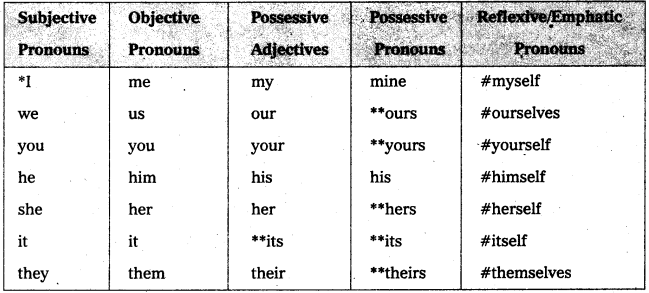
*’ I’ is written as a Capital letter at all positions in a sentence.
** The pronouns in these cases do not take an apostrophe.
Note: Sometimes we see an apostrophe with ‘it’ as it’s. There it means ‘it is’. The apostrophe stands for the missing letter ‘i’.
# The Reflective Pronouns and the Emphatic Pronouns look alike. Both of them end with ‘self or ‘selves’. But they differ in their function. The reflective pronoun serves as the object where as the emphatic pronoun emphasizes the subject.
E.g. : He convinced himself (he’ is the subject and ‘himself is the object reflecting the subject.)
E.g. : He convinced her himself. (himself emphasizes the subject ‘he’)
The Demonstrative Pronoun combines the demonstrative adjective and noun. It helps to show persons or things.: E.g.: This, that, these, those and such etc.
E.g. : That is not what I mean.
Show this to him.
Note : The Demonstrative Pronoun and the Demonstrative Adjective look alike but differ in function. The Demonstrative Pronoun does not take any noun after it but the Demonstrative adjective is always followed by a noun. E.g. : ‘this’, ‘that’, ‘these’, ‘those’, ‘such’ etc.
This is not mine. (Demonstrative Pronoun)
This book is not mine. (Demonstrative Adjective)
The Distributive Pronoun combines the distributive adjective + Pronoun. E.g. : ‘each’, ‘any’, ‘either’, ‘neither’ etc. It distributes individual units from a group.
E.g.: Neither of the books serves the purpose.
Each of the soldiers has a gun. The Indefinite Pronouns are vague and do not refer to any particular person.
E.g. : ‘one’, ‘none’, ‘nobody’, ‘nothing’, ‘some’, ‘something’, ‘someone’, ‘many’, ‘few’, ‘all’, ‘any’, ‘anybody’ etc.
E.g. : None came forward.
Someone picked my purse.
The Interrogative pronouns look like the Relative Pronouns. They help question the missing subject or object or things. E.g. : ‘who’, ‘whose’, ‘whom’, ‘what’, which’ etc.
E.g. : Who did it. (Subject)
Whose book is it? (Possessive)
Whom do you want ? (Object – Persons)
What / Which do you want ? (Object – Things)
Note : What’ and ‘which’ can also be Interrogative Adjectives when followed by a noun.
E.g. : What/Which book do you want ?
Relative Pronouns such as ‘who’, ‘whom’, which’, ‘that’ and ‘whose’ relate themselves to the immediate noun before them.
E.g. : I saw the boy who got the first rank. (Relative Pronoun – Sub.)
I saw the boy whom the CM honoured (Relative Pronoun – Obj.)
I saw the boy whose brother got the first rank. (Relative Pronoun – Possessive)
I saw the car which met with an accident yesterday. (Rel. Pro: – Obj.)
I saw the boy that got the first rank. (Rel. Pro. – Obj.)
The Reciprocal Pronoun expresses a mutual or reciprocated relationship.
E.g. : One another, each other.
E.g. : The couple understood each other. (Used with two)
The students helped one another. (Used with more than two).
Task 2
1. Underline the pronouns in the passage (to be taken from text).
Once there was a lion. The lion was very cruel. The lion killed the animals indiscriminately and ate the animals. Gradually, the number of animals began to dwindle. One day, the animals held a meeting. The animals proposed to the lion that the animals would offer only one animal daily, as the lion’s food. The lion agreed to the truce. One day, it was the turn of the clever rabbit. The rabbit hit upon a plan. The rabbit went to the lion late. When the lion demanded an explanation, the rabbit told the lion the the rabbit was held up on the way by another lion who declared himself as the real king of the forest.
Verb:
A Verb’ usually means action. A part from action, the verb carries tense with it. Verbs are broadly 2 types.
Regular and Irregular Verbs :
Verbs which form their past and past participle forms with the help of the suffixes ‘ed’ or ‘t’ are known as Regular Verbs and those formed with change of vowel are known as irregular verbs.
E.g. : dance, danced, danced (regular)
Learn, learnt, learnt (regular)
E.g. : take, took, taken (irregular)
See, saw, seen (irregular)
Cut, cut, cut (irregular)
Finite Verbs and Non-Finite Verbs :
The Tense Carrying verbs are called Finite Verbs while the tense less verbs are called Nonfinite Verbs. The tense carrying verbs can be in Present or Past forms. (go and went) The tense less verbs can be ‘Infinitive (to go/go) or ‘Present Participle’ (going) or ‘Past Participle’ (gone).
Note : An Infinitive looks like present form. But it carries no tense.
Infinitives can be with or without ‘to’ in front of them.
E.g.: I wish to serve in India. (to’ infinitive)
She made me do that. (bare infinitive without ‘to)
Auxiliary Verbs :
There are other verbs called the Auxiliary Verbs which occur in front of the action verb (infinitive) and add force or emotion to the action verb. E.g. : will, shall, can, may, must, etc.
E.g. :
Ravi plays chess. (action + Present tense)
Ravi is a chess player. (No action + Present tense)
Ravi can play chess. (Can = Aux Verb + Present tense + ability)
(Play = infinitive/action verb)
Transitive Verbs and Intransitive Verbs:
Verbs which take objects are called Transitive Verbs’ and those without objects are called ‘Intransitive Verbs.’
E.g. : Ravi Plays chess. (Transitive Verb)
He slept well. (Intransitive Verb)
Note :
Verbs will be discussed detail under the topic Tense.
Here is a brief list of irregular verbs :
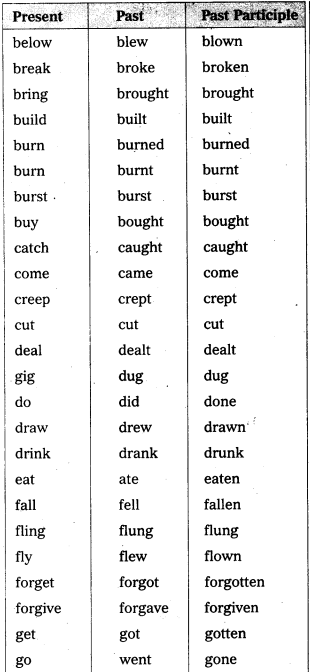
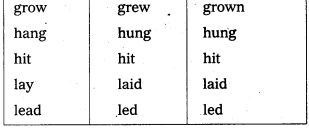
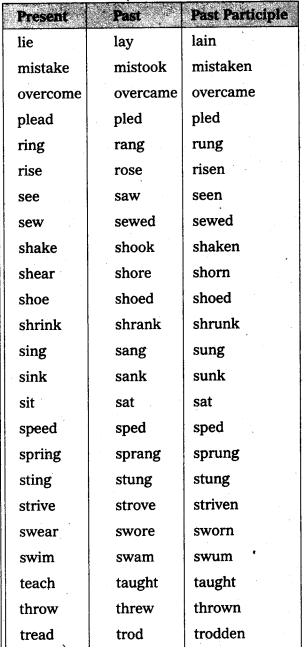
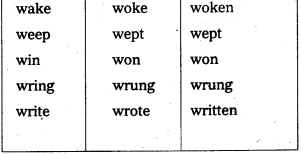
Task 3
I. Underline verbs in the following sentences.
Question 1.
She told me a secret.
Answer:
told
Question 2.
One should love one’s country.
Answer:
love
![]()
Question 3.
I want to become a doctor.
Answer:
want to become
Question 4.
Ravi is a gentleman.
Answer:
is
Question 5.
It was ten last night when we parted.
Answer:
was, parted
Question 6.
My father is working in paper mill.
Answer:
is, working
Question 7.
Slow and steady wins the race.
Answer:
wins
Question 8.
Time and tide waits for none.
Answer:
waits
Question 9.
Books give knowledge.
Answer:
give
Question 10.
We have been striving hard to make him understand that.
Answer:
striving, make, understand
Adjective:
An Adjective qualifies a noun. It shows the quantity, quality, number etc about the noun. Adjectives can occur before a noun or after the noun. Adjectives are of different kinds. Look at these sentences.
E.g. : Meera is a good girl. (good=adj. of quality qualifying the noun ‘girl’)
I won many awards. (many=adj. of quantity qualifying the noun ‘awards’)
The American plane landed in New Delhi. (America =Proper Adj. qualifying ‘plane)
Sudha designed her career. (her=Possessive adj. qualifying the noun ‘career’)
She got three prizes. (three=Numerical Adj. qualifying the noun ‘prizes’)
This book is very interesting. (This=Demonstrative Adj. qualifying the noun ‘book)
Each book costs Rs. 100. (Each=distributive Adj. qualifying the noun ‘book’)
Which book did you read ? (Which=Interrogative Adj.qualifying the noun ‘book’).
I bought a hundred books. (hundred=numerical Adj. qualifying the noun ‘book)
The Qualitative Adjectives describe the quality of the noun (good, blue, old, kind, etc.).
E.g. : Have you every seen a blue whale ?
They sell old things here.
Madan is kind and helpful.
The Quantitative Adjectives qualify or modify the quantity of the noun. (little, much, enough, no, any, whole, half, full etc.)
E.g. : I have a little knowledge about robotics.
He wasted much time arguing with other.
Suresh has enough GK to succeed in the test.
You have no excuse for this.
He studied arithmetic the whole year.
Proper Adjectives are proper Nouns functioning as adjectives. (Indian, American, Himalayan, Herculean etc.)
E.g.: Patanjali is an Indian brand.
The British Prime Minister visited India.
We use Nilagiri tea.
It is a Herculean task for you.
Adjectives showing possessions of persons are called Possessive Adjectives. (my, our, your, his, her, its, their etc.)
E.g. : I serve my country.
This is our dog.
Your house is very near.
They know their limits.
Adjectives showing definite numbers such as forty, first, last, next are called Numeri cal Adjectives.
E.g. : I told you a thousand times.
My son is in the second standard.
‘T’ is the first person.
Indian won the match last time also.
The Demonstrative Adjectives help show the noun. (this, that, these, those, such etc.)
E.g. : This house is very old.
I know these tricks.
Can you name that book ?
Such people are quite dangerous.
Adjectives like each, every, either, neither, etc. referring to individual units from a :: group are called Distributive Adjectives.
E.g. : Each soldier has a gun.
I enquired every passerby.
You can take either book.
Neither money nor power can tempt him.
The Interrogative Adjectives such as what, which and whose, are used in front of nouns to question.
E.g. : I don’t know what plans you have.
Which shirt do you like ?
Whose bag is it?
Order of Adjectives
When too many adjectives occur before a noun, they follow a certain order as shown below.
Adjectives usually take this order : Opinion + Size + Shape + Age + Colour + Nationality + Material :
E.g.: The historical, huge, rectangular, new white Chitrangi Palace is behind my office.
Comparison of Adjectives
Adjectives and adverbs form degrees namely, Positive Degree, Comparative Degree and Superlative Degree. All root adjectives are called Positive forms while the addition of suf fixes ‘er’/ ‘more’ to the root make Comparative forms and the suffixes ‘est’/most’ make Superla tive forms.
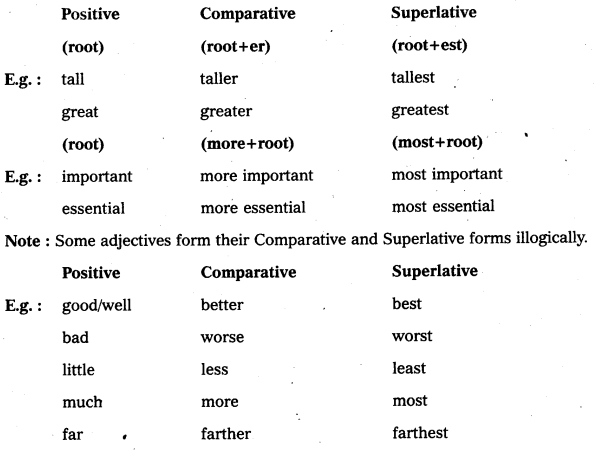
Adverb
Adverbs modify a verb or an adjective or another adverb. They add details regarding the time, place, manner, degree or extent of an action. Adverbs are usually formed from adjectives with the help of the ‘ly’ suffix.
E.g. : He walks slowly.
Ramya is very clever.
Usha recovered quite well.
There are several types of adverbs. The Adverbs of Time show when an action is over. E.g. : before, now, lately, daily, already, since, formerly, late, ago, soon, yesterday, never, tomorrow etc.
E.g. : She came yesterday.
I have read it before.
The Adverb of Place shows where the action has taken place. E.g. : here, everywhere, up, within, away, there, out, in, backward etc.
E.g. : Please come here.
She sat down.
The Adverb of Manner shows how the action has taken place. E.g. : clearly, well, soundly, sadly, bravely, hard, etc.
E.g.: Gita spoke clearly.
You did well.
Note : Usually, the adverbs of manner and degree are formed with ‘ly’ suffix.
E.g. : clear – clearly; great – greatly etc.
E.g. : We have met twice.
Let’s meet again.
The adverbs which show ‘how much’ or in ‘what degree’ or to ‘what extent’ of action are called the Adverbs of Degree or Quantity. E.g. : too, almost, fully, very, enough, so, altogether, no, pretty, any, quite, rather, partly, as ……… etc.
E.g. : We are fully prepared.
He came twice. The Adverbs of Affirmation are ‘surely’ and ‘certainly’ and Adverb of Negation is ‘not’.
E.g. : We will certainly do it.
I do not know that.
The Adverbs of Reason explain the reason for action. E.g. : hence, therefore etc.
E.g. : The man, hence, obeyed to pay the penalty.
We, therefore request you to pass the orders.
The Intergative Adverbs help asking questions. Where, when, why, how, how many, etc.
E.g. : How is your health ?
Where are you?
The Relative Adverbs like relative pronouns related to the verbs that occur before them.
E.g. : That is the reason why he never comes here.
Do you know when America got independence ?
Adverb or Adjective ?
Sometimes, the same form serves as both the adverb and adjective. They can be distin guished by their function. The adjective modifies the noun whereas the adverb modifies the verb. Look at the examples below :
E.g. : He is a hard nut. (hard’ is an adjective modifying the nouni ‘nut’ ?)
He works hard. Chard’ is an adverb modifying the verb ‘works)
Words indicating frequency such as ‘early’, ‘daily’, ‘weekly’, yearly’, ‘hourly’, and ‘quar terly’, ‘half-yearly’ etc. function both as adjectives and adverbs.
E.g. : This is a weekly magazine.
(Weekly’ is an adjective modifying the noun ‘magazine’ ?)
It comes out weekly. (weekly’ is an adverb modifies the verb ‘comes’.)
The early bird catches the worm. (The adjective ‘early’ modifies the noun ‘worm’.)
I wake up early. (The adverb ‘early’ modifies the verb ‘get up’.)
Some such words are fast, half, straight, just, late, low, clear, clean etc.
Task 4
Choose the correct Word.
Question 1.
He came ………. (good/well)
Answer:
well
Question 2.
He solved the problem (quick/quickly)
Answer:
quickly
![]()
Question 3.
Gracy spoke ………. (loud/loudly)
Answer:
loudly
Question 4.
Gita moves ………… (friendly/friend) with all.
Answer:
friendly
Question 5.
They performed the job …………. (efficient/efficiently)
Answer:
efficiently
Question 6.
The bus arrived ……………… (late/lately)
Answer:
late
Question 7.
It all happened quite …………….. (accidental/accidentally)
Answer:
accidentally
Question 8.
Children turn …………….. (nervous/nervously) when ranks are announced.
Answer:
nervous
Question 9.
The tea tastes ……………… (strong/strongly)
Answer:
strong
Question 10.
The children jumped …………… (joyfull/joyfully)
Answer:
joyfully
Prepositions
A Preposition is a word that expresses the relationship of a noun with another noun, adjective or verb in the sentence.
E.g. :I saw the teacher in the class.
He is angry with me.
He is waiting for me.
Prepositions are classified based on their structure and formation. The simple preposi tions do not take any affixes. They are short and little. (E.g. : at, by, for, from, in, into, of, off, on, out, over, till, to, up, upon, with, under, down.)
E.g. : Please look at the blackboard.
The procession starts from the town hall.
He fell off the road.
The books lay on the table.
She was born in 2015.
They are waiting at the main gate.
Confusing Pairs of Prepositions
1. In – At
a) In is generally used with countries, cities and town. e.g. in Bombay, in Vijayawada;
At is usually employed with small towns, and village. e.g. at Kovvur, at Muvva.
b) In is used with names of Roads. e.g. In MG Road, in the main bazaar etc.
At is used with addresses. e.g. at 18-1, Tilak Road, Rajanagaram, Eluru.
2. Since – For
a) Since is used with exact point of time past month, year, day or time. E.g. : since 1980, since last February.
Since the accident; since he left the town etc.
b) For is used with duration of time. E.g. : for 2 days; for 10 years; for 5 mts. etc. Forever
3. Beside – Besides
a) Beside means by the side of. E.g. : He sat beside me.
b) Besides means in addition to. E.g. : He speaks Hindi and English besides Telugu.
4. Between – Among
a) Between is used if the number is two. E.g. : Between France and Germany.
b) Among is used when the number is more than two. E.g.: among four brothers, among six friends.
5. Along – Across
a) Along is used to mean parallel. E.g. : Banks are built along rivers to stop overflowing.
b) Across means from one end to another. E.g. : He walked across the hall.
6. In-into and on -onto
a) In and on show the position of stationary objects
- The doctor is in the clinic
- The book is on the table.
b) On and onto show the movement.
- The doctor is going into the clinic.
- The book is thrown onto the table.
Task – 5
Fill in the blanks with suitable prepositions.
1. Ammajee spoke ……………… Women’s problems.
Answer:
on
2. I was born ………….. an auspicious day.
Answer:
on
3. The Government has reduced taxes ……………. medicines.
Answer:
on
4. The latest mobile is …………. sale.
Answer:
for
5. Children wear new clothes ……………. festivals.
Answer:
for
6. Answer the question …. 50 words.
Answer:
in
7. MK Gandhi was born …………… 2nd October ……………. Porbandar …………… Gujarat.
Answer:
on, at, in
8. My uncle is living …………… SP Road, Secunderabad.
Answer:
at
![]()
9. Don’t stand too long ………… the sun.
Answer:
in
10. He was sent ……………… Jail ……………… Charges ….. theft.
Answer:
to, with, of
Conjunction
A conjunction is a connecting device in language. it connects phrases, clauses, or sentences. E.g. as, and, because, but, etc. There are three different kinds of conjunctions.
The Coordinating Conjunctions join two or more Principal Clauses. (for, and, nor, but, or, yet, so)
The Subordinating Conjunctions join two or more subordinating clauses with a main clause. These are after, although, as, because, before, how, if, once, since, than, that, though, until, when, where, whether, and while.
The Correlative Conjunctions always occur together as a pair in a sentence. E.g. “both/ and”, “whether/or,” “either/or,” “neither/nor,” “not/but” and “not only/but also.”
Co-ordinating conjunctions are used to form compound sentences while subordinating conjunctions that are used to form complex sentences.
Coordinating conjunctions can be remembered easily with the acronym “FAN BOYS”
E.g. :
for – I prefer natural diet for I want to maintain a good health.
and – He goes to office at 8.00 am and the returns by 5.00.
nor – The dog does not eat grass nor does it allow the cattle to graze.
but – The ant works but the grasshopper enjoys life all the time.
or – You can take B.A or B.Com.
yet – I warned him several times yet he never rides slowly.
so – He got a distinction so everyone has praised him.
Here are a few examples for subordinating conjunctions :
E.g. : because – He stood first in IAS purely because of his hard work.
if – You may do it if you like.
when – She was sleeping when the phone rang.
until – I shall wait here until you come.
Correlative Conjunctions
The correlative conunctions occur in pairs. They occur at different places in the sentence.
E.g.: Both Rama and his sister got through the test.
I don’t know whether he joins us or not.
Either Ravi or Rana will conduct the game.
The thief stole not only my bag but also my wallet.
It is not you but your honour which is at stake.
Task – 6
Combine the following sentences using one appropriate conjunction from the pair given.
Question 1.
He is late. He was made to stand outside. (As/unless)
Answer:
He was made to stand outside as he was late.
Question 2.
Work hard. You will succeed this time. (if/when)
Answer:
You will succed this time if you work hard.
Question 3.
He proved. He was not guilty. (so/that)
Answer:
He proved that he was not guilty.
Question 4.
I was crossing the road. I saw an accident. (when/because)
Answer:
I saw an accident when I was crossing the road.
Question 5.
You study from day one. You need not over strain at the end. (if therefore)
Answer:
You need not over strain at the end if you study from day one.
Question 6.
He fainted in the assembly. He hadn’t had break fast. (because/when)
Answer:
He fainted in the assembly because he hadn’t had breakfast.
Question 7.
He lost his wallet. He lost his shoes. (not only …… but also/or)
Answer:
He lost not only his wallet but also his shoes.
Question 8.
Join within three days. You will lose your job. (or/when)
Answer:
Join within three days or you will lose your job.
Question 9.
Madhav is rich. He does not spent a pie. (so/but)
Answer:
Madhav is rich but he did not spend a pie.
Question 10.
She was sleeping. The thief entered the house. (while/or)
Answer:
The thief entered the house while she was sleeping.
Interjection :
An interjection is a word or phrase which expresses a speaker’s sudden emotion or feel ing. They stand alone and are placed before or after a sentence. Interjections are found in all languages. E.g. : Hey! Oh! Ouch! Ugh!
E.g. : Alas ! the old man could not see his son’s prosperity.
Oh ! I forgot to bring the book today.
Sometimes, adjectives and nouns can be used as interjections in a sentence.
E.g. : Nice ! You won the distinction.
Good ! You can move on to the next step.
Congratulations, you won the match.
Hello ! How are you?
Note : An interjection may be followed by a comma or an exclamatory mark. Weak inter jections take a comma while stronger ones are followed by an exclamatory mark. Some impor tant interjections and their emotional meanings are given below.
eek! = Surprised, scream
eww! = Disgusting
hurrah! = joy nah! = no
oh! = I see
ooh! = Wonderful
oops ! = Surprise on acknowledging mistake, error
ouch! = pain
wow ! = Impressed, astonished
yeah! = yes
Alas! = sorrow
Ahem! = clearing the throat (‘attention” or “listen”)
Aah! = scared
Boo! = to scare someone or to voice disapproval
Eh! = when you didn’t hear or understand what someone said
Hmm = thinking or hesitating
Oops = when you accidentally do something
Yahoo = joy or happiness
Yeah = strong affirmation or approval
Exercise – 1
Identify the Part of the speech of the following underlined words :
Question 1.
The young girl brought me a very long letter from the teacher.
Answer:
adjective
Question 2.
My parents are traveling to Japan next month.
Answer:
noun
Question 3.
He doesn’t want to go with them.
Answer:
pronoun
Question 4.
Seema wanted those, but decided to compromise on these.
Answer:
conjunction
Question 5.
The boy who called yesterday came to see you.
Answer:
pronoun
Question 6.
The old man was talking in a quiet voice.
Answer:
adjective
![]()
Question 7.
My brother is stronger than me.
Answer:
adjective
Question 8.
Calvin runs quickly.
Answer:
adverb
Question 9.
The children ran happily to their father.
Answer:
adverb
Question 10.
Have a look under the couch.
Answer:
preposition
Question 11.
Raghav didn’t pass the test because he didn’t understand the subject.
Answer:
conjunction
Question 12.
Oh dear! What happened ?
Answer:
interjection
Question 13.
Edward drove for hours.
Answer:
preposition
Question 14.
The new car broke down.
Answer:
adjective
Question 15.
Wow, that looks amazing!
Answer:
interjection
Question 16.
Tears began to fall as Dolly saw the completely lifeless body of her dog.
Answer:
adverb
Question 17.
Elizabeth walks gracefully.
Answer:
verb
Question 18.
Emma is smart and beautiful.
Answer:
verb
Question 19.
This house is like a palace.
Answer:
noun
Question 20.
Not all old trains are considered classics.
Answer:
adjective
Question 21.
Meena doubts if she’ll pass the test.
Answer:
conjunction
Question 22.
There were a lot of ifs in the insurance policy.
Answer:
noun
Question 23.
The bridegroom looked so handsome.
Answer:
adjective
Question 24.
Riya whispered to Rasool so that no one else will hear.
Answer:
conjunction
Question 25.
Do you smoke ?
Answer:
verb
Question 26.
Shiya found her cat outside.
Answer:
Preposition
Question 27.
Hellen promised to write back soon.
Answer:
adverb
Question 28.
This lotion can provide protection from the sun.
Answer:
preposition
Question 29.
I knew it from the very beginning of the movie.
Answer:
pronoun
![]()
Question 30.
Darcy watched Jane as she walked through the crowd.
Answer:
conjunction
Question 31.
What clothes did you buy ?
Answer:
verb
Question 32.
What a charming lady!
Answer:
adjective
Question 33.
Congrats! Finally you won the match.
Answer:
interjection
Question 34.
Rashmi got an A grade in Mathematics.
Answer:
preposition
Question 35.
My father sends money once a week.
Answer:
adverb
Question 36.
Who is that man ?
Answer:
noun
Question 37.
Dorothy has big blue eyes.
Answer:
verb
Question 38.
The Shuttle flew into space.
Answer:
verb
Question 39.
Unless you work hard, you cannot reach the goal.
Answer:
conjunction
Question 40.
I left my keys undertaken the table for you.
Answer:
preposition